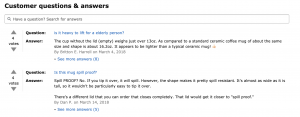A simpler approach to SEO
I loathe how SEO is made out to be a complicated, non-understandable concept. The way I see it, through its highly complicated algorithm, Google actually tries to recommend sources the same way you or I would.
Google’s goal, just like yours or mine when we’re asked for a referral or recommendation, is to provide the best results based on what it is asked.
So….
I looked at how I chose to refer others and started applying the same thought process to how I approach SEO.
If you ask me to refer, say a web developer, I’ll give you a few names. Who I recommend and the order I recommend you contact them (ranking) is based on a host of factors, but when it comes down to it, there are only 3 which matter:
- Who can provide what you need (search query)
- How credible they are (authority),
- Where you or they are located (location).
Essentially I am ranking who I recommend based on the 3 factors.
While I do look at other considerations when making referrals – things like personality conflicts – those are reserved for help refining the ‘search results’, not for actually determining who to ‘return’.
Applying this Concept to Google
What if I narrowed down the 200 factors Google actually uses and only concern myself with three of them – the three, as it turns out, are pretty simple?
If you want to me to consider recommending or referring you, at the minimum, I need to know what you can provide in the way of products and services, show me you are credible and where you work. Much of what I, or you, will learn about someone is through networking groups and events. When first meeting, credibility is hard to gauge and it is near impossible to learn everything you provide. Heck, there are people I have known for years and I am just finding out some of the things they do! Over time, and with continued interaction, I learn more. I meet others and hear testimonials. I get a good sense of the work you provide and your reputation. The more we network, the more I learn and more comfortable I am with recommending you.
As I see it, Google does just this using your content as opposed to conversation. You write, Google learns. The more you write, the more Google knows. As you write more, the content, whether web pages or blog posts, builds a knowledge base. Authority comes from your content (based on sitewide keyword density showing Google you are the subject matter authority) and backlinks (for all practical purposes, testimonials).
Understanding search query
In a real broad stroke, while people still search for keywords, the move is clearly toward looking for answers. Searches are more natural now. Rather than searching for “social media for SEO’, people are more likely to search for ‘How does social media affect SEO’ or ‘How do I use social media to improve my SEO’. It’s how I search.
And if I really had no idea what question to ask? I will start with a broad keyword. Interestingly, the keyword itself rarely provides a link I’ll click. What it does is help me better determine what I need to enter in the search box.
Knowing this, I pay little attention to keywords. I’m concerned with knowing what my audience wants or needs to know. I’ll let others worry about keywords that help narrow the search in my favor.
How to improve
Tailor how and what you write with this in mind. Strive to write quality content which provides the answers your audience needs is asking, on the topics where you have expertise. Your goal is to do it and in a way which is easy to read and understandable.
How often do you search in Google then use what is provided to perform a more targeted search?
Focus on the narrower search – specific content for specific searches. It means less focus on keywords which you would not likely rank for given the size and authority of your site.
Write for your audience. Write to provide answers or make others think. Do not write for SEO.
Bonus: If you continue to write for your audience on subjects where you have expertise, over time industry keywords will appear naturally. More so, rather than specific articles ranking for a word or phrase, your site will rank for them. This sitewide keyword density goes a much longer way to building site authority.
Authority
When you look to hire anyone, you want the expert. While I do not know exactly what Google uses to determine authority, I have some ideas based on what I have learned over the years and a little common sense applied from the factors above I use personally.
For SEO, a good measure of expertise is a site’s Domain Authority. Moz looks at a variety of factors from a site’s link profile to trust scores to calculate, based on Google’s algorithm, how likely a site will be to rank in searches. In general, the higher a website’s domain authority (trust, expertise) the better chance of ranking (or ranking higher) for a given search query than a similar site.
Domain authority, like Google’s algorithm, is based on a variety of factors and not easy to influence. So rather than try, I have found it best to work on two specific aspects:
- Reducing the appearance of spam – things like too many outbound links relative to the size of your website, paid ads, etc.
- Increasing the number of quality backlinks from other authoritative (and preferably more authoritative than your own) sites.
Spam
How external linking, or linking out, affects SERPs has been the subject of numerous articles. From a common sense position, it has no direct effect. The value comes indirectly from increasing credibility by citing sources. Credible articles are more likely linked to (backlinks) and shared (increased visibility leading to greater potential for backlinks).
Too many external links, however, has the exact opposite effect. How credible or authoritative can it be if all you do is link to other sources? Highly authoritative articles cite references to back up their ideas, not rely on them to make their case. (And traditionally too many external links likely meant the point of the article wasn’t to inform but to drive traffic to other sites – most of which were spam.)
How to improve:
Reducing spam does, to a degree, require time. My spam score as measured by Moz was at 3 until recently (it’s now 1). Newer websites generally contain less content making the number of outbound links relative to your amount of content higher. When you write articles, do not ‘overdo it’ when it comes to external linking. It is the best means of limiting how much affect spam scoring has on your rankings (aside from posting paid ads which should never be done).
Backlinks
This is the single best way, in my opinion, to improve your authority. More quality links from reputable websites tells Google your site is credible. The higher the Domain Authority of the referring site, the more ‘link juice’ you receive. Your goal is to create a link building strategy aimed at receiving quality, natural (no link swaps or paid links) backlinks from the most authoritative sites possible.
How to improve:
Start with writing those quality, easy to read and understand articles on subjects in your field of expertise.
Get those articles visible! Getting your article seen by the right person is the foundation for pure, organic backlinks.
The latter is the biggest hurdle, especially for a new brand or website with little to no initial authority (the old Catch-22). So how do you do it? This one of the biggest values of social media. Social sharing of blog content is the single best way to create visibility. If you have built the right relationships, share your content and drive traffic through social networking, it will be seen.
Location
While Domain Authority plays a significant role – again credibility is everything – there are numerous other critical factors tied to site architecture (design and coding). The one thing that might, however, really make the grade – your reviews. Check out this case study done Pam Ann Marketing.
How to improve
The two best steps you can take:
1) Make sure all of your address listing across the web are correct and most importantly are on your website – including in the coding).
2) Get those positive, genuine reviews!
Make sure you are monitoring your reputation (I highly recommend Mention) and that you address every review, especially the negative ones, immediately if not sooner!
My bottom line
There are far more moving parts to SEO than what I have listed above. I do not want you to think this is all you need to know. However, I have been able to significantly improve my SEO and SERPs (being in the top 10 results on multiple search engines for multiple keywords and phrases) and build the domain authority of this site in a very short time strictly by doing what I have written above:
- Writing for my audience, not SEO (in fact I never did ANY keyword research for this site).
- Building my Domain Authority using a link building strategy driven by the relationships built through social networking.
I do adhere to some basic SEO principles by checking what I write and optimizing it with Yoast’s WordPress SEO Plugin, but it in the end….
SEO for me comes down to writing good content which answers the questions your potential customers are asking in a straightforward, readable and authoritative manner.
Do these consistently over time and, for the most part (assuming your site was properly developed), SEO will take care of itself.
A final note
I focus as much on SEO as I do social media for a very simple reason – the big picture. One goal of your social media marketing strategy should be focused on driving website traffic. Your website is your best source for lead generation and most likely sales point.
Social media has an amazing ability to drive traffic directly through content and indirectly, by way of improved SEO and search rankings, through social networking. Developing an overall blueprint to accomplish your goals requires both be tightly integrated. Social media and SEO go hand in hand.
Digital & Social Articles on Business 2 Community(58)




